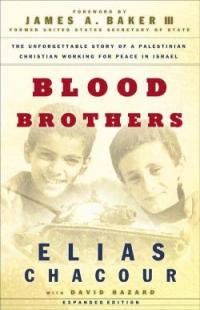 "Blood Brothers" is the first book from Palestinian Israeli Elias Chacour. Elias is a Christian priest and community leader in Galilee, Israel. He lives and serves his community of Palestinian Christians in a village of Muslim, Druze and Christian villagers. This book is the personal story of his youth, the expulsion of him and his family from his home village of Biram, his training as a Melkite priest, and his eventual work in the ministry of bringing hope to a broken and terrified group of alienated Arabs in Jewish Israel. Unlike his other book We Belong to the Land, Chacour focuses more poignantly in Blood Brothers on his personal and family life. Most profoundly, he explores the character of his father who serves as an arch-type for both God and the image of what good men can be. Elias Chacour treasures and follows this image into a lifetime of seeking reconciliation, hope and love for the Palestinian people of the village of Ibillin.
"Blood Brothers" is the first book from Palestinian Israeli Elias Chacour. Elias is a Christian priest and community leader in Galilee, Israel. He lives and serves his community of Palestinian Christians in a village of Muslim, Druze and Christian villagers. This book is the personal story of his youth, the expulsion of him and his family from his home village of Biram, his training as a Melkite priest, and his eventual work in the ministry of bringing hope to a broken and terrified group of alienated Arabs in Jewish Israel. Unlike his other book We Belong to the Land, Chacour focuses more poignantly in Blood Brothers on his personal and family life. Most profoundly, he explores the character of his father who serves as an arch-type for both God and the image of what good men can be. Elias Chacour treasures and follows this image into a lifetime of seeking reconciliation, hope and love for the Palestinian people of the village of Ibillin.
One such powerful example is his father’s statement about Jews and Palestinians, which he declared before the full extent of persecution would begin for the Palestinians:
“But How do we know the soldiers won’t harm us?” Rudah pressed him.
Father smiled, and all the tension seemed to relax. “Because,” he said, “the Jews and Palestinians are brothers-blood brothers. We share the same father, Abraham, and the same God. We must never forget that. Now we get rid of the gun.”[1]
This image turns out to be misinformed, though hopeful premonition to the tragedy that would ensure. After taking over the land of Palestine, the Jews of Israel began to programmatically terrorise the people of the rural villages such as Biram. Demolishing their homes and farms and confiscating the land became the program of the Zionist Jews. Even thought Chacour’s father has his land taken from him and his home destroyed, his connection to the land and its plants shows a level of care foreign to us.
I could scarcely believe it! His life's work had just been torn from his hands. His land and trees-the only earthly possessions he had to pass on to his children-were sold to a stranger. And still Father would not curse or allow himself to be angry. I puzzled at his words to us. Inner peace. Maybe Father could find this strength in such circumstances. I doubted that I could....
Father's other response to the sale of his land was more of a wonder to me. In a few weeks we heard that the new owner of our property wanted to hire several men to come each day and dress the fig trees, tending them right through till harvest. Immediately, Father went to apply for the job, taking my three oldest brothers with him. They were hired and granted special work passes, the only way they could enter our own property.[2]
Elias portrays his father with such magnanimous character that he seems barely real to our western sensibilities and callousness. The story of Blood Brothers is much deeper than just Elias Chacour’s life, it is a story of the non-violent Palestinians who are persecuted as evil by Israeli government programs meant to lodge them from hope and from land within the Galilee communities. Chacour is not just a concerned priest, he is a thoughtful change agent and leader. Speaking about the inversion of the Jews from persecuted to the persecutors he says :
Now I determined to find out how a peaceful movement that had begun with a seemingly good purpose-to end the persecution of the Jewish people-had become such a destructive, oppressive force. Along with that determination, I was driven by a respect for history that Father had planted in me. Did the seeds of our future hope lie buried in our past, as he had so often said?[3]
Elias is brilliant to turn to the teaching of his father to recall the thought that history can teach us and, perhaps if heard, can lead us back together. Blood Brothers tries to convince the reader that Zionist Israel is the major obstacle to reconciliation with the Palestinians, though he is against violence of all sort, including from the Palestinian people. He outright rejects the military efforts of the PLO and looks instead for a reconciled Israel in which Jews and Arabs can live together.
Amazon Book Link: http://amzn.to/wMi0KA
Review by Kim Gentes
[1]Chacour & Hazard “Blood Brothers”. (Grand Rapids, MI: Chosen Books 1984), Kindle Location 325
[2] Ibid., Location 613
[3] Ibid., Location 1158